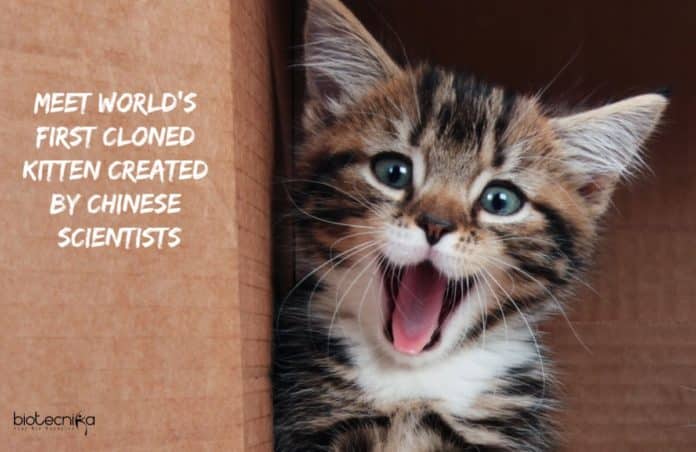First Cloned Kitten
The sudden death of Huang Yu’s pet cat Garlic came as a shock to him. Thanks to the Chinese firm Sinogene, they created a Clone of Yu’s pet cat. Huang, 23, was delighted seeing Garlic’s second incarnation. He said that the similarity between the two cats is more than 90 percent.
The New Garlic- First Cloned Kitten- was Born on 21st July. Sinogene became the first Begin company in doing so.
The pet-cloning company has made more than 40 pet dogs. This procedure costs a massive 380,000 yuan ($53,000), whereas the cost for a cat comes around 250,000 yuan ($35,000).
Mi Jidong, the company’s CEO, said that most of their clients are young people, even though the price of the procedure is on the higher side. He added that Owner’s see these cloned animals as a part of their family. Pet cloning meets the emotional needs of the young generations.
The happy owner, Huang Yu, says he hopes the personality of the new Garlic is as similar to his old white-and-gray cat as its appearance.
Here is a video of the First Cloned Kitten:
With a growing pet market in China and a massive appetite among their
owners for spending, Mi Jidong thinks the market for pet cloning is also set to escalate. According to reports from Pet Fair Asia and pet website Goumin.com, pet-related expenditure in China reached around 170.8 bn yuan ($23.7 billion) in 2018.China’s scientists have big aspirations for their next cloning challenge. The researchers are working on the theory that if cats can be cloned, so can pandas.
Chen Dayuan, an expert at the Chinese Academy of Sciences, has been studying giant panda cloning for 20 years. He said that there could be scope for cats to give birth to cloned baby pandas. Baby pandas are smaller than baby cats despite their large size when fully grown.
Pet cloning is banned in many countries but approved in some countries including the US and South Korea, where singer Barbra Streisand announced last year she had cloned her dog.
The first significant success in animal cloning was Dolly, the sheep. She was born in Britain in 1996. Dolly is the first mammal cloned from an adult cell.
In 2005, scientists from South Korea cloned the first dog. The Sooam Biotech Research Foundation in Seoul says it has cloned around 800 pets. They charge $100,000 each.






























